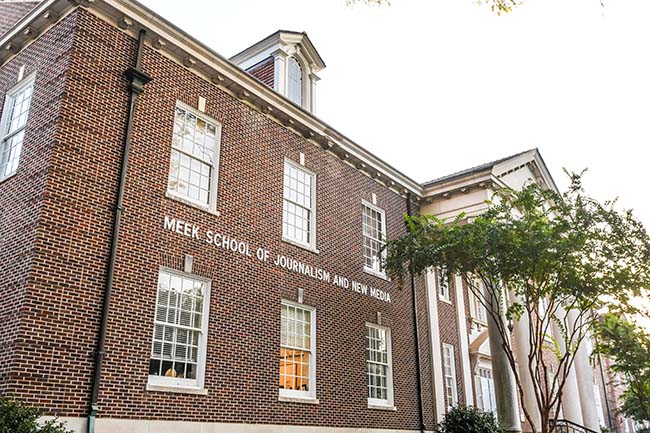Ole Miss to consider removing Ed Meek’s name from School of Journalism and New Media
Published 3:19 pm Friday, September 21, 2018

- Meek School of Journalism and New Media is located at the University of Mississippi, in Oxford, Miss. on Thursday, September 20, 2018. (Bruce Newman, Oxford Eagle via AP)
In an email to students on Friday, University of Mississippi Chancellor Jeffrey Vitter announced that the University will move forward in the process of potentially removing Ed Meek’s name from the Meek School of Journalism and New Media.
“Our leadership team has heard a lot of input — both in the last 48 hours and prior to that time — about the environment at Ole Miss and in Oxford as both the university and the town have grown. Our community has long taken pride in providing a welcoming environment for all who come here to study or visit. However, a number of students eloquently stated at last night’s campus listening sessions that our community does not always feel welcoming to them. We heard you,” Vitter said in the email.
The email comes two days after Meek published a post on his personal Facebook page that some deemed to have racist undertones.
Since the post went viral, Ole Miss students and faculty have condemned Meek’s comments, including a video statement from the journalism school, led by the school’s dean, Will Norton, Jr.
On Thursday night, Ole Miss students, faculty and staff, as well as members of the Oxford and Lafayette community participated in an open forum to discuss views regarding Meek’s posts. Many of those who spoke at the meeting requested that his name be removed from the building.
Vitter said that the University will move forward with a “two-pronged process” that will enable to community to address concerns that extend from Meek’s post.
“The near-term prong, which involves consideration of a name change for an academic unit, is governed by existing university process,” Vitter said.
UM will follow an outlined process to modify the name of the journalism school, steps which include:
- The faculty committee of the academic unit must approve a recommendation to make a name change.
- If that faculty group recommends a change, the matter must be taken up by the Undergraduate and Graduate councils. These councils have faculty from across the entire university and one voting student representative on each council.
- The actions of the councils are then considered by the Council of Academic Administrators, which is chaired by the provost. Its voting members include all deans, the Faculty Senate chair, faculty representatives, the three vice chancellors within Academic Affairs, the ASB president, and the Graduate Student Council president.
- If the Council of Academic Administrators recommends a change, the matter is referred to the Chancellor, who would decide whether to make a request to the IHL Board for consideration and a final vote.
“This process is, by design, thoughtful and intentional. It is open to input from students, faculty, staff, and alumni, and it meets all accreditation requirements for changing organizational units on campus, including a unit’s name. We will follow this approach to consider any name change,” Vitter said.
The process will be open to input from students, faculty, staff and alumni, Vitter said.
Katrina Caldwell, Vice Chancellor for Diversity and Community Engagement, will lead an initiative with long-term goals, Vitter said.
The purpose of the initiative will include “expedited acquisition of additional feedback and consideration of new actions and strategies to address concerns around university and community climate” and also be open to students, faculty, staff and alumni.





